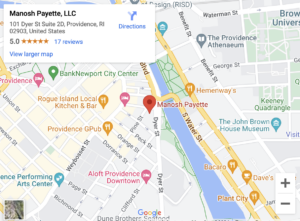
Are you facing a restraining order or being accused of violating one in Providence, RI? If so, it can create significant legal challenges. Fortunately, you don’t have to navigate these complex scenarios alone. Working with an experienced Providence restraining order lawyer will significantly increase your chances of successfully managing your situation.
Our attorneys at Manosh Payette Criminal Defense Attorneys are well-versed in state laws and know the intricacies associated with these types of cases including drug crimes, Providence domestic violence, sex crimes, Providence homicide charges, and more. We have 36 years of combined experience and believe that everyone deserves a trusted legal advocate when facing allegations and criminal consequences.
If you need help fighting a restraining order, contact our law firm by calling (401) 854-7794 to schedule a free consultation with an experienced criminal defense lawyer in Providence.
How Manosh Payette Criminal Defense Attorneys Can Help If You’re Facing a Restraining Order in Providence, RI

Being faced with a restraining order in Providence could disrupt your life in profound ways. At Manosh Payette Criminal Defense Attorneys, we recognize this challenge and can provide essential help during these trying times.
Here’s how our Providence criminal defense attorneys can assist:
Examine Evidence Presented For the Restraining Order
Our lawyers are experienced in examining all evidence presented against our clients. We’ll scrutinize this evidence thoroughly to determine its authenticity and credibility. We will also pay close attention to the accuser’s testimony and compare it to any written reports made to look for inconsistencies.
Represent You at Court Hearings
Fighting a restraining order requires effective representation at court hearings, and we’ll stand by you during those crucial moments. Our lawyers are adept at conveying your side of the story in a persuasive manner to challenge the claim.
We’ll work diligently to counter allegations with fact-based arguments and challenge any misleading narratives. We understand how hard it is for you to be in that courtroom, and we will always strive to present your side of things truthfully and convincingly.
In some cases, this might involve negotiating plea deals if you are facing criminal charges alongside a restraining order.
Assist You If the Restraining Order Is Issued
Despite our best efforts, judgments may not always be favorable. If a restraining order is issued against you, we won’t stop there. We’ll ensure that you fully understand all the terms stipulated, helping you navigate what can and cannot be done under these conditions. We will do everything we can to make sure you’re able to comply with the order.
Dealing with a restraining order can be a stressful experience. Fortunately, you never have to face this situation alone. Contact Manosh Payette Criminal Defense Attorneys for a free initial consultation with a restraining order lawyer in Providence, Rhode Island.
Overview of Restraining Orders in Rhode Island
Rhode Island law provides two main orders designed to protect alleged victims from various behaviors. It’s helpful to understand the two types and be able to distinguish the differences.
No Contact Orders
A No Contact Order (NCO) relates specifically to an ongoing criminal case and usually gets issued at the time of arraignment. It stays effective throughout the course of the case and can only be dropped at the request of the alleged victim with the judge’s approval.
Restraining Orders
Unlike a No Contact Order, restraining orders are an option even in the absence of a criminal case. They are primarily used when there are allegations of abusive behavior, assault, threats, or stalking. There are different types of restraining orders depending on the relationship between the alleged victim (or petitioner) and the respondent (the person the order is issued against).
For example, if the respondent is a spouse, former spouse, co-parent, or other qualifying individual, the petitioner can file a domestic violence restraining order against them.
A Temporary Restraining Order (TRO) is typically granted right away when the alleged victim applies for it. Once issued, this preliminary order remains in effect for up to 21 days, during which time the defendant must be served so they’re aware of the order.
After the defendant is served, a hearing will take place to determine if a more permanent restraining order should be in place.
The Hearing For a More Permanent Restraining Order
After the respondent – or defendant if there is also an ongoing criminal matter – is served with a temporary restraining order, a hearing takes place where both parties can appear in front of the judge to present evidence and make arguments for and against the restraining order.
If the petitioner misses their court date without a valid reason, the temporary order will expire.
If the accused doesn’t show up, the judge is permitted to grant a final restraining order as long as there is proof of service. In some cases, the judge may alternatively reschedule the hearing.
After all evidence is presented and the arguments are made, the judge will make their decision.
Possible Stipulations in a Providence Restraining Order
A restraining order is ultimately designed to shield an individual from harassment, stalking, physical harm, or threat. Once it’s issued, there are certain stipulations the respondent must follow.
While the specifics may be different for each case, there are some basics that are typically included in all restraining orders:
No Contact or Communication
Most orders will bar the respondent from having any contact whatsoever with the petitioner. This includes in-person contact as well as phone calls, texts, social media outreach, and even contact through another individual.
Residence Exclusion
A restraining order may also state that the respondent is no longer allowed to enter or come near the petitioner’s primary residence. If both parties share a home and the situation has called for steps as drastic as imposing a restraining order, you may be required to relocate.
Temporary Custody Arrangements
If children are involved, the court might establish temporary child custody and visitation arrangements. It will also stipulate how the visitations and handoffs of children should occur.
Surrender of Firearms
Once a final restraining order is issued, the judge may also require that the respondent surrender any firearms they possess. During this time, the purchase of a firearm is also illegal.
Adhering to these conditions isn’t just a guideline – it is an absolute necessity, as the consequences of non-compliance can be quite severe.
What Are the Potential Penalties For Violating a Restraining Order in Rhode Island?
To be guilty of violating a protective order, it must be proven that you willfully disregarded the stipulations set forth in an order arranged by the court. These charges are not taken lightly. This is a misdemeanor offense and carries up to one year in prison and/or fines of up to $1,000 if you violated a restraining order issued in family or district court.
If the restraining order you violated was from the Superior Court, this is not a criminal violation. It is considered civil in nature, and the respondent will be brought back to court for contempt, which can sometimes lead to incarceration.
What Defenses Can Be Raised If I’m Accused of Violating a Restraining Order in Providence, RI?
Being accused of violating a restraining order can be an overwhelming experience. However, it’s important to bear in mind that accusations are not proof in and of themselves. There are often legitimate defenses that may apply to your case. Here are some common ones:
Lack of Knowledge
This defense is frequently based on inadequate service or no service at all. The law requires the defendant to have been officially notified of the restraining order. If this doesn’t happen, the order may not be considered valid, and the defendant is unable to violate it.
Unintentional Violation
In some instances, there may be a genuine misunderstanding or error which leads to an inadvertent violation. For example, if you accidentally ended up at the same location as the protected person without any intention of doing so and had no way around it, arguing this point in court might lead to a favorable outcome for you.
False Accusations
Unfortunately, false accusations are not uncommon in such cases, often stemming from personal disagreements or spite. If you can prove that the alleged victim has falsely accused you of violating a restraining order – perhaps by showing inconsistency in their statements or displaying contrary evidence like video clips, text messages, etc. – this defense can negate the violation charges against you.
Mistaken Identity
This defense arises in cases where you are identified as having been somewhere when it was really someone else. An alibi reinforced with reliable corroborating evidence – such as timestamped camera footage – can bolster your defense.
Accusations of violating a restraining order come with serious penalties. Therefore, securing an experienced attorney to advise you throughout this process is crucial for successfully asserting these defenses.
Schedule a Free Case Evaluation With Our Experienced Providence Restraining Order Lawyers
Dealing with the complexities and stigma associated with restraining orders or violations of one is undoubtedly difficult. But remember, help is available. Seek support from a knowledgeable lawyer about local restraining order laws to ensure your rights are protected.
If you need help, we’re always here for you. Contact Manosh Payette Criminal Defense Attorneys to schedule a free consultation with a Providence restraining order attorney.
Our Criminal Defense Law Firm in Providence, RI, Also Provides:
- Rhode Island theft crime lawyer
- White collar crimes in Providence, RI
- Providence federal crimes lawyers
- Probation violation attorneys in Providence, RI
- Gun charge attorneys in Rhode Island
Visit Our Criminal Defense Law Office in Providence, RI
Manosh Payette Criminal Defense Attorneys
101 Dyer St Suite 2D, Providence, RI 02903, United States
(401) 854-7794

